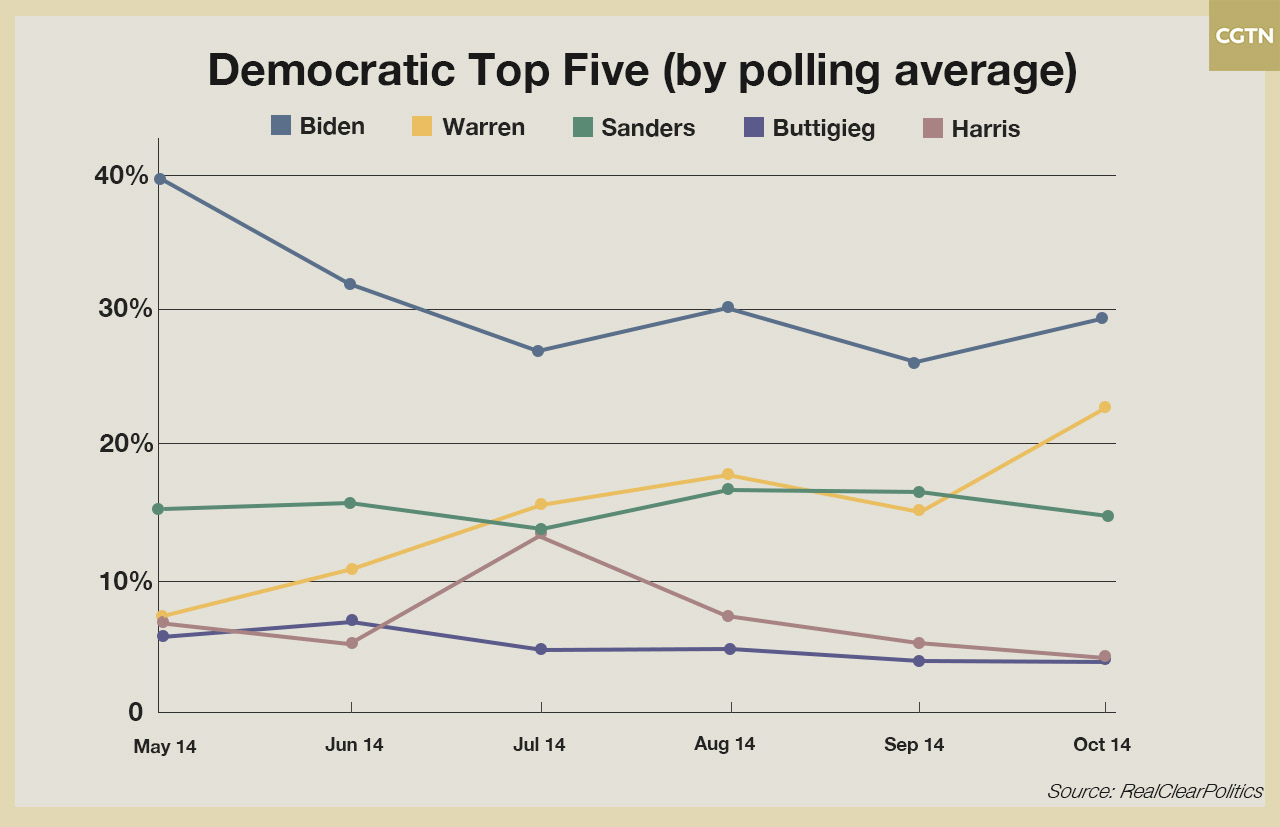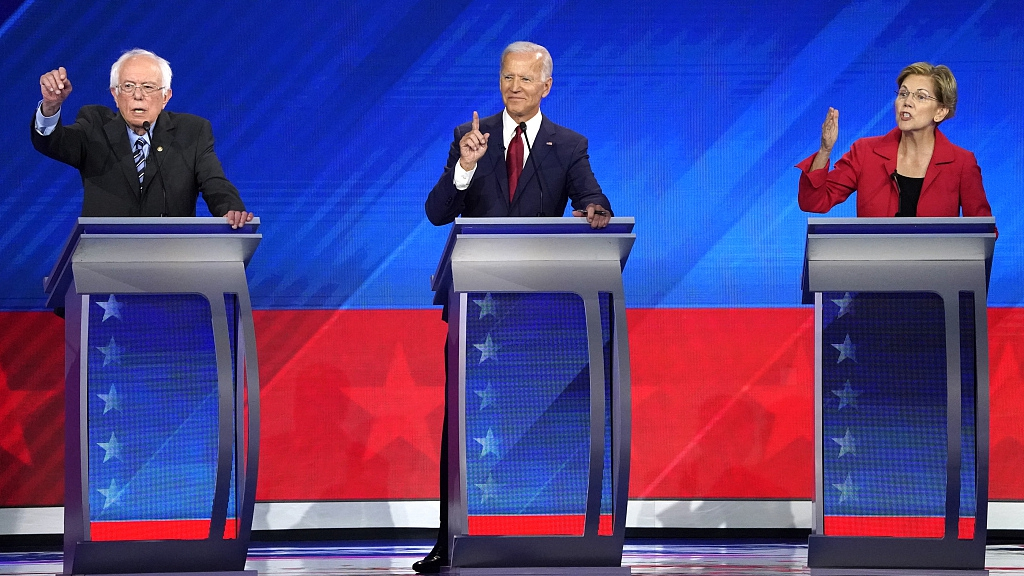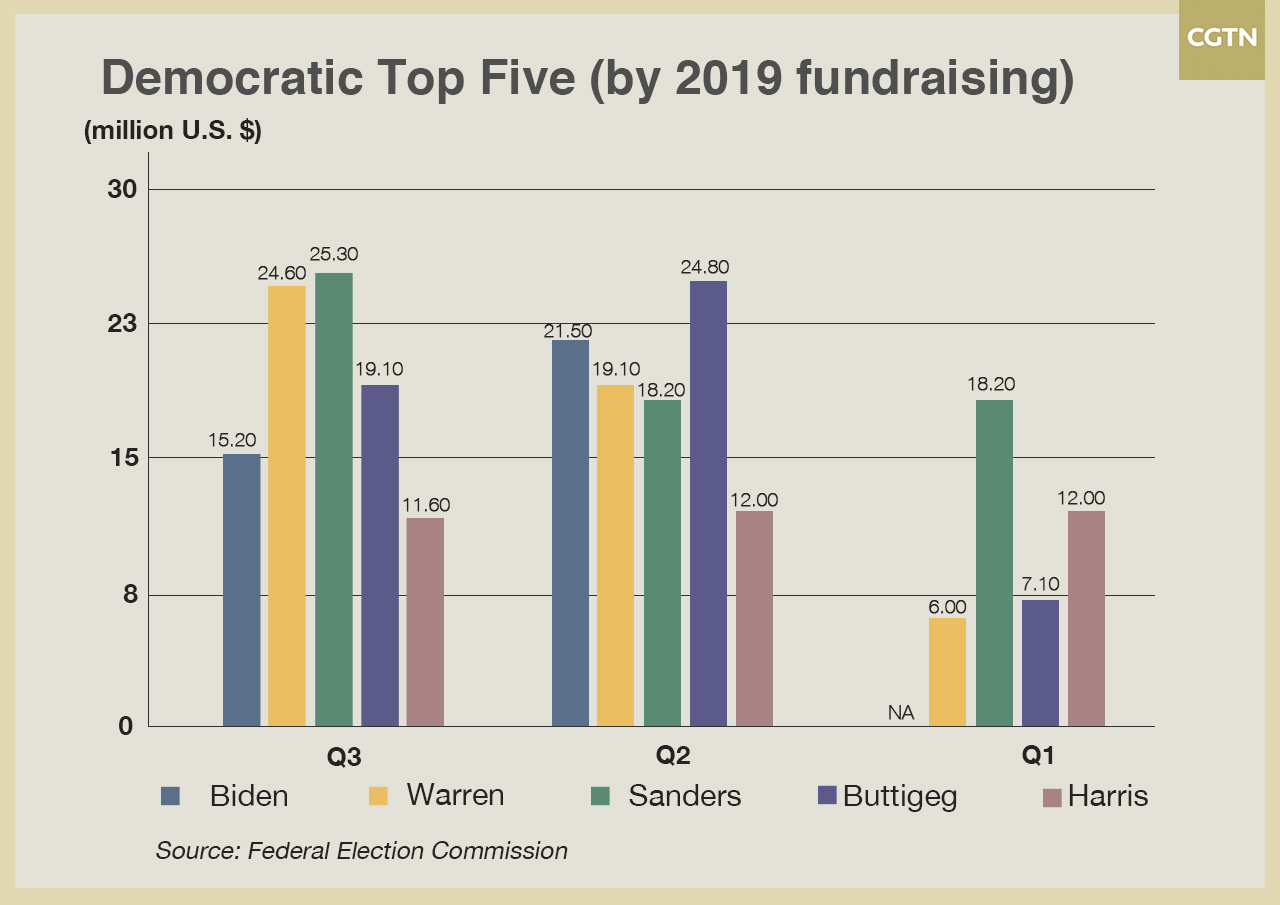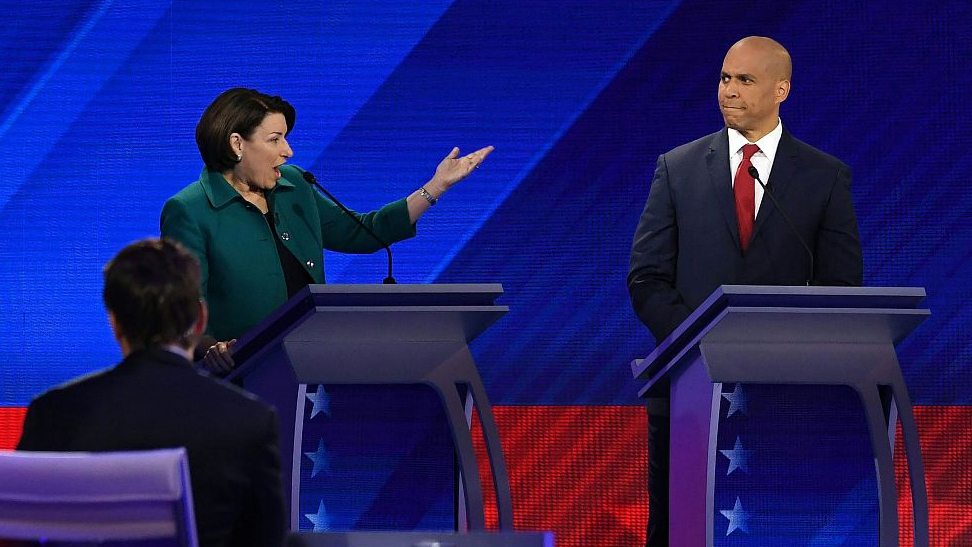Twelve Democratic presidential hopefuls will line up in Ohio on Tuesday evening in the fourth debate of the 2020 nominating cycle, the first since an impeachment inquiry into U.S. President Donald Trump was launched.
Three septuagenarian candidates lead the polls, and all three have question marks against their names. Joe Biden is at the center of the impeachment storm, Elizabeth Warren's ability to win a general election is doubted by some, and Bernie Sanders suffered a heart attack just a fortnight ago.

Impeachment has dominated the airwaves for the past month and will likely be the backdrop to the CNN/New York Times debate, but low-polling outsiders candidates will be determined to take advantage of the media glare to highlight their platforms and prevent the lights going out on their campaigns.
1. Will Biden be hunted?
The candidates are likely to be unanimous in backing the Trump impeachment and have avoided criticism of the Biden connection, wary of playing into the president's talking points.
But, while there has been no evidence of impropriety in the actions of Biden or his son Hunter, a vice president's son taking a well-paid job in a country his father has special responsibility for does raise questions the candidate will need to convincingly answer.
In The Spotlight: Hunter Biden
Graphics: Can Trump's 'red wall' be shattered?
Timeline: Trump-Biden-Ukraine controversy
In the heat of a debate, with moderators setting the agenda and low-polling Democrats striving for a break-out moment, it's likely the issue will come up. And with the Trump 2020 campaign in attack mode Biden, who has largely avoided addressing the issue in public, needs to show he has a solid response.
The former vice president argues he is the candidate best-equipped to beat Trump and says the attacks show the president fears him, but with Biden's poll numbers no longer dominant and third-quarter fundraising disappointing he is under pressure to deliver a strong performance.
2. Is Warren now a target?
Elizabeth Warren has slowly and steadily risen up the polls over recent months, and some surveys now suggest she is the frontrunner. She still trails in the polling averages, but the 70-year-old's ascent gives her new status – and puts a target on her back.
Some Democrats fear Warren, while running an effective primary campaign, would alienate moderates and donors in the general election. She will be under pressure to explain her plan for beating Trump, and show that she can be ruthless – to-date she has largely avoided criticizing Democratic rivals and hasn't faced extensive scrutiny.

Senator Bernie Sanders, former vice president Joe Biden and Senator Elizabeth Warren participate in the 2020 Democratic debate in Houston, Texas, September 12, 2019. /VCG Photo
Senator Bernie Sanders, former vice president Joe Biden and Senator Elizabeth Warren participate in the 2020 Democratic debate in Houston, Texas, September 12, 2019. /VCG Photo
Given the Massachusetts senator's reputation as an anti-cronyism candidate, she is likely to be pushed by moderators to jab at Biden. If she takes the bait it could be a decisive moment in the campaign, but she may be content to stand back while others swing.
Overall the campaign is going well for Warren, with steady momentum propelling her up the field. She also continues to attract donations, raking in nearly 10 million U.S. dollars more than Biden in the third quarter despite refusing to take part in big dollar fundraising events.
3. Can the Sanders campaign recover?
The Sanders 2020 campaign is on a downward curve, but is likely to be sustained by the veteran senator's continued ability to raise money in small donations. He topped the third-quarter fundraising rankings with 25 million U.S. dollars and, health-permitting, is in for the long haul.
The 78-year-old came close to beating Hillary Clinton in 2016 and is doing well in states including California and Nevada, but in a crowded field and faced by Warren – with whom he shares many policies – he was dipping in the national polls even before suffering a heart attack on October 1.

The debate will be the 78-year-old's first step back on the campaign trail after several media appearances from his Vermont home – his health and energy, and by extension his capacity to serve as president, will be closely scrutinized.
In an interview ABC on Sunday Sanders said that the heart attack had made him all the more determined to fight to for his Medicare-for-all healthcare plan, but also took a swipe at Warren for the first time – if he attacks his rival face-to-face it will mark a turning point in the contest.
4. Spotlight on trade, foreign policy?
Foreign and trade policy has featured on the margins of the first three Democratic debates. Neither issue has drawn significant coverage or resulted in major flashpoints.
That's likely to change on Tuesday evening after a week in which Trump has controversially pulled U.S. troops out of Syria, clearing the way for a Turkish offensive, and claimed to be close to a trade deal with China.
U.S. warning as Syria situation worsens
Trump on China, U.S. trade dispute
Several candidates – including Warren and Sanders – are non-interventionist by nature, while military veterans Pete Buttigieg and Tulsi Gabbard have called for an end to "endless wars." They will be watched closely to see how they square their positions with criticism of Trump's decision.
It will also be an opportunity for Biden, who has been regularly criticized for backing the war in Iraq, to show off his extensive foreign policy experience.
5. The end for low-polling candidates?
Buttigieg continues to score high in donations but low in the national polls, while Kamala Harris has been treading water since her viral clash with Biden in the first debate.
Both are well-funded but have failed to sustain spurts of momentum. With less than four months to go before the caucuses in Iowa – where Buttigieg has had some traction – they both need to expand their pools of support if they're to make a serious tilt for the top job.

Minnesota Senator Amy Klobuchar (L) speaks as New Jersey Senator Cory Booker listens during the third Democratic primary debate, Houston, Texas, September 12, 2019. /VCG Photo
Minnesota Senator Amy Klobuchar (L) speaks as New Jersey Senator Cory Booker listens during the third Democratic primary debate, Houston, Texas, September 12, 2019. /VCG Photo
For some of the other seven candidates on stage, Tuesday could be the beginning of the end. All seven are polling below three percent nationally on average, and Gabbard, Julian Castro, Amy Klobuchar and Beto O'Rourke are among those struggling to reach the higher thresholds for entry to November's fifth debate. Tuesday night is a big opportunity, and that could mean some bold moves.
Missing out on a debate isn't necessarily terminal for a campaign – billionaire Tom Steyer makes his debut on Tuesday, Gabbard has bounced back after falling short in September, and seven candidates other are still campaigning despite not making the stage – but it is a big hit on media coverage and fundraising. The field is likely to winnow further over the next month.